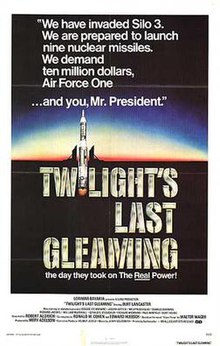Twilight's Last Gleaming
| Twilight's Last Gleaming | |
|---|---|
 |
|
| Directed by | Robert Aldrich |
| Produced by | Merv Adelson |
| Written by |
Ronald M. Cohen and Edward Huebsch (screenplay) Walter Wager (novel) |
| Starring |
Burt Lancaster Richard Widmark Charles Durning Paul Winfield William Smith |
| Music by | Jerry Goldsmith |
| Cinematography | Robert B. Hauser |
| Edited by |
Michael Luciano William Martin Maury Winetrobe |
|
Production
company |
|
| Distributed by | Allied Artists |
|
Release date
|
|
|
Running time
|
146 min |
| Country | United States West Germany |
| Language | English |
| Budget | $6.2 million |
| Box office | $4.5 million |
Twilight's Last Gleaming is a 1977 film directed by Robert Aldrich and starring Burt Lancaster and Richard Widmark. The film was a West German/American co-production, shot mainly at the Bavaria studios.
Loosely based on a 1971 novel, Viper Three by Walter Wager, it tells the story of Lawrence Dell, a renegade USAF general, who escapes from a military prison and takes over an ICBM silo near Montana, threatening to launch the missiles and start World War III unless the President reveals a top secret document to the American people about the Vietnam War.
A split screen technique is used at several points in the movie to give the audience insight into the simultaneously occurring strands of the storyline. The film's title, which functions on several levels, is taken from The Star-Spangled Banner, the national anthem of the United States of America:
After escaping from a military prison, the rogue Air Force General Lawrence Dell and accomplices Powell, Garvas, and Hoxey infiltrate a Montana ICBM complex that Dell helped design. Their goal is to gain launch control over its nine Titan nuclear missiles. The infiltration does not go as planned, as the impulsive Hoxey guns down an Air Force guard for trying to answer a ringing phone. Dell then shoots and kills Hoxey. The three then make direct contact with the US government (avoiding any media attention) and make their demands: $10 million ransom, and that the President go on national television and make public the contents of a top-secret document.
The document, which is unknown to the current president but not to certain members of his cabinet, contains conclusive proof that the US government knew there was no realistic hope of winning the Vietnam War but continued fighting it for the sole purpose of demonstrating to the Soviet Union their unwavering commitment to defeating communism.
...
Wikipedia
